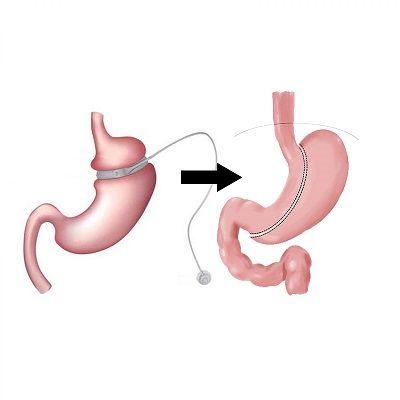
Numerous elements, including lifestyle decisions, genetic predisposition, eating patterns, and levels of physical activity, can contribute to weight gain. People acquire weight when they consume more calories than their bodies can burn off because the extra calories are deposited as fat. Physical activity helps to burn calories and maintain a healthy weight, thus leading a sedentary lifestyle and not getting enough exercise regularly can also contribute to weight gain. Additionally, a person’s metabolism and how their body uses and stores fat can be affected by hereditary characteristics, which can affect weight gain in different ways depending on the individual. However, all these contribute to weight gain that ultimately makes the individual self-conscious and lowers their self-esteem. Bariatric Surgery can help to lose weight but individuals fear if complications occur after the surgery. And if Is Bariatric Revision Surgery Right for You.
What is it?
Bariatric Revision Surgery in Dubai modifies and adjusts a prior bariatric surgery that did not produce the expected weight reduction or that had difficulties. However, bariatric surgery is a medical procedure that intends to assist people with extreme obesity lose weight by changing the digestive tract to reduce food intake or nutrient absorption,
But occasionally, the initial bariatric procedure may not result in the anticipated weight loss, or patients may have issues or adverse effects. Bariatric revision surgery is taken into consideration as a way to treat these problems and enhance weight reduction success or manage complications.
Procedure:
Revision bariatric surgery entails making changes or alterations to a prior treatment for weight loss that either did not have the expected effects or had difficulties. The first step of this procedure is to make a thorough assessment of the person’s medical background, weight reduction status, and any ongoing issues from the first bariatric surgery.
Depending on the type of initial bariatric surgery and the reasons for the revision, several surgical approaches are helpful for bariatric revision. If a patient has a gastric bypass but did not lose enough weight, the surgeon may decide to enlarge the size of the pouch to improve food absorption and accelerate weight reduction. In instances when a gastric banding treatment has difficulties, the surgeon may remove the band or switch to another weight loss technique, such as a gastric bypass or sleeve gastrectomy.
Results:
Bariatric revision surgery is a complicated treatment that calls for a surgeon with extensive training and experience. It is more difficult than primary bariatric surgery since it entails meticulously deconstructing and rearranging the previously changed digestive system. Bariatric revision carries the same risks and problems as any surgical operation, including the possibility of infection, hemorrhage, and negative anesthetic responses.
The outcomes of this surgery might vary depending on the individual’s unique circumstances, the type of first bariatric surgery, and the reasons for the revision. In order to obtain better results, this complicated technique seeks to solve problems from a prior weight reduction procedure, such as insufficient weight loss or complications.
Is Bariatric Revision Surgery Right for You?
Deciding on whether this procedure is right for you or not is itself a complex and difficult process. The individual who wants to opt for this procedure should consider his progress. In addition, the weight loss from the previous surgery, complications or side effects, and any health-related issues that are getting worse after the surgery. Therefore, after considering all the variables the individual should consult a qualified physician who can guide accurately about the procedure.
Aftercare:
Since it is a revision of the initial surgery. Therefore, the doctor strictly advises the patient to adhere to the aftercare measures. These aftercare measures help individuals to measure their progress. They also help to reduce the risks and complications. Moreover, make the results more durable and effective.
- Keep an eye out for infections at the location of the cut.
- Drink plenty of water to promote healing.
- Keep your appointments for all planned follow-ups.
- Track your progress in losing weight.
- To manage your weight over the long run, practice mindful eating.
- Utilize prescription drugs to treat pain and discomfort.
- Consume meals slowly and properly chew them.
- Skip the high-fat and sugary meals.
- Exercise in a low-impact manner.
- Utilize relaxing techniques to reduce stress.
- Give up smoking to speed recovery.
- Report any problems or concerns immediately
- Keep up excellent hygienic habits, particularly near the surgical site.
- Avoid exposing the incision site to unnecessary trauma or pressure.
Benefits:
It is a complex but advantageous procedure. And can help to treat the complications or issues of the previous bariatric surgery.
- Enhances weight reduction for those whose initial bariatric surgery did not produce the anticipated outcomes.
- Overcomes issues or negative effects from the prior weight loss operation.
- Better control over health issues caused by obesity.
- Increases energy and movement, which improves the quality of life.
- Maintains weight over the long term while following post-operative instructions.
- Potentially lower hazards associated with obesity and longer life expectancy.
- Enhances self-esteem and body image.
- Improves clothes fit and more comfort throughout regular activities
Book A Consultation!
Are you still confused over Is Bariatric Revision Surgery Right for You? Dynamic Clinic in Dubai only hires competent and skillful doctors. They are highly experienced and can clear all your concerns. Simply, fill out the consultation form to schedule your appointment.











